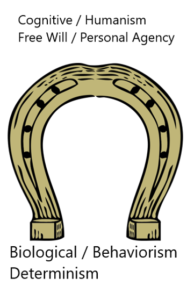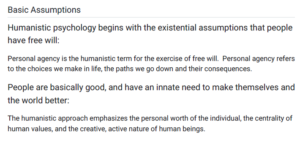
The ‘nature versus nurture’ ‘debate’ in psychology reminds me of the ‘free will versus determinism’ perspectives in philosophy. [This is probably because my focus is rooted in philosophy though!] The biological / nativists and behaviorists are far more aligned than the spectrum suggested in the text which places them at opposite ends. I tend towards determinism, though I like to present myself as a soft-determinist or compatibilist. I readily accept Kant’s rebuke of this as “wretched subterfuge”! I am a hard-determinist, but I lack the conviction to come out and say such. Daniel Dennett is way better at rationalizing (and explaining) compatibilism than I am. That giant empty space above determinism representing the great unknown (and, from my perspective, unknowable) weakens my confidence in hard determinism ¯\_(ツ)_/¯.
We are ‘meat puppets’ (or wind-up toys) who are biologically predetermined to react (and importantly – perceive) in a specific set of ways given set stimulus. The environment is the determinant of how our biological wiring expresses itself. Am I comfortable thinking about life (specifically my own) this way? Not really. Which is why I try not to obsess over it too much. My ‘out’ is there is so much I don’t know, and I comfort myself with the belief that much of it is unknowable as well.
I get the attraction of the idea of ‘free will’ / personal agency. It is, assuredly, unsettling to think of oneself as nothing more than pre-written code being executed within a larger pre-written program. I also (like to try at least to) share the optimism of the humanistic approach, though the post-modern facet of it is like ‘nails on a chalkboard’ to me. The bigger problem is the inherent contradiction:

I do not understand how we can have both an “innate need” (and drive) and assume we have “free will”. Accepting my limitations, maybe someone can ‘explain this to me like I am five’.
… kenny